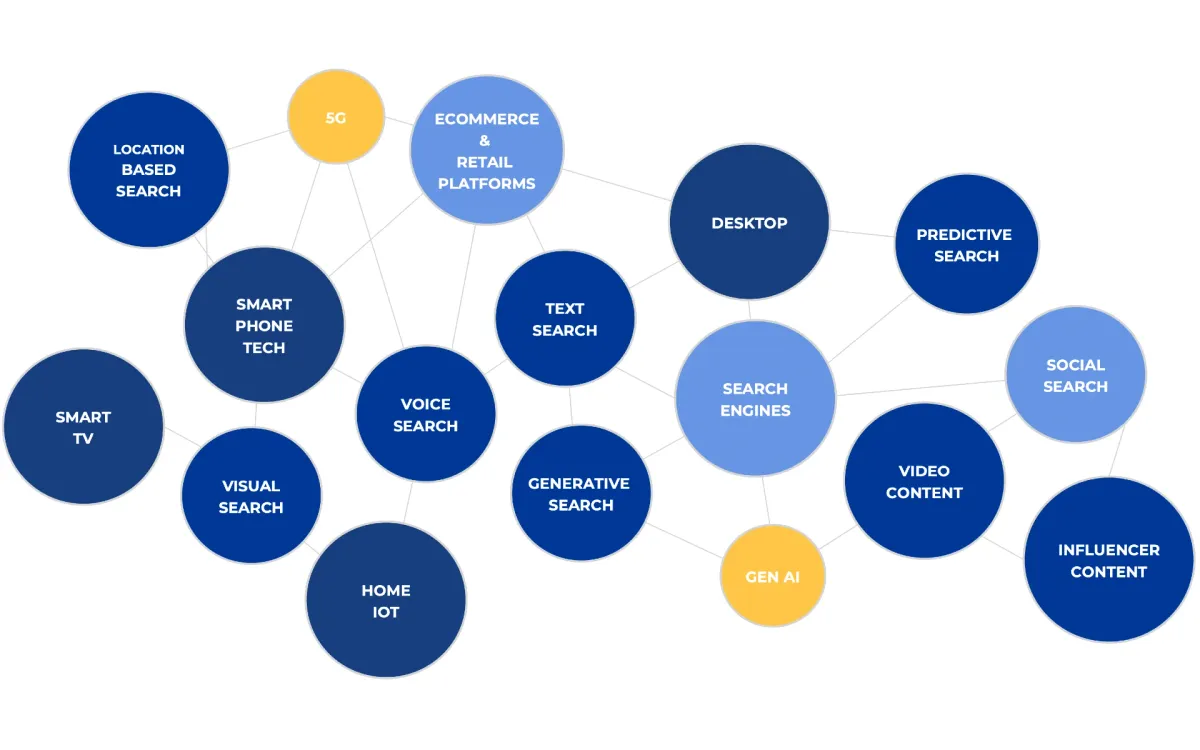
A comprehensive report released in December 2024 by Omnicom Media Group (OMG) reveals significant changes in how consumers approach search across digital platforms. According to proprietary OMG research, over 40% of consumers report spending more time searching compared to five years ago, with 66% conducting searches primarily on smartphones.
The research, based on a national online survey of 1,419 adults aged 18-65 conducted in September 2024, indicates that traditional search engine dominance faces unprecedented challenges. While search engines maintain 89.3% of global market share and generated $175 billion in revenue during 2023, emerging platforms are rapidly gaining traction.
According to OMG's findings, 54% of consumers believe no single platform serves all their search needs. The data shows varying levels of platform adoption: 76% use ecommerce platforms like Amazon and Target, 64% utilize YouTube, and 54% engage with social media platforms including TikTok, Meta, and Pinterest for search purposes.
Trust remains a crucial factor, with 74% of consumers citing it as the primary consideration when choosing search platforms. Traditional search engines command higher trust levels for sensitive topics - 74% turn to them for healthcare information and 69% for financial queries. However, the research reveals a generational divide in trust dynamics.
The study finds that 45% of Gen Z and 41% of Millennials trust search results from individuals over institutional sources, compared to just 26% of Gen X and 16% of Boomers. This preference particularly manifests in social media usage, where younger demographics value video content and navigation convenience.
Retail platforms have emerged as significant players in the search ecosystem. OMG's research indicates that 58% of consumers value retail platforms for deal aggregation, while 55% appreciate their product comparison capabilities. Amazon and Walmart dominate this space, with 63% of consumers preferring retail platforms over traditional search engines (56%) for active shopping searches.
The integration of generative AI (GAI) marks another significant shift. The study reveals that 52% of surveyed consumers now use full-length query questions with GAI search, while 40% employ complete questions on traditional search engines. This behavioral change demonstrates the cross-pollination of search habits from GAI platforms to conventional search engines.
Smart TV manufacturers have also carved out their niche in the search landscape. According to OMG's data, 38% of consumers now utilize Smart TVs for search functionality, particularly in content discovery across streaming platforms.
The research methodology employed comprehensive approaches to gather these insights. OMG utilized Q, their AI-powered cultural intelligence application, analyzing over 85,000 signals from articles, blog posts, patents, and academic journals posted over the past 12 months. This analysis focused on five key cultural elements: Super Apps, Constant Connection, Warm Tech, Utility AI, and Snack Media.
The transformation of search behavior carries significant implications for the advertising industry. Google's AI Overviews introduced ads in Q4 2024, while Perplexity has begun serving advertisements. OpenAI announced in December 2024 its exploration of search advertising opportunities, though it currently does not serve search ads.
Michael Sondak, SVP, Head of Search at OMG NA, states that this evolution requires organizations to adapt their creative strategies across platforms. The research emphasizes the need for authentic, snackable, and interactive content that resonates with evolving media consumption habits.
The findings indicate that measurement paradigms must evolve to account for cross-platform consumer journeys. The report recommends deeper engagement with Marketing Mix Modeling and MTA partners to ensure accurate data capture in an environment characterized by cookie loss and walled gardens.
This comprehensive study underscores the transformation of search from a monolithic channel to a complex ecosystem of consumer behaviors, requiring strategic adaptation from marketers and platforms alike.

